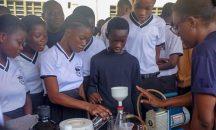Sustain health promotion campaigns on COVID-19 vaccination – SEND Ghana

Dr Emmanuel Ayifah addressing the media
Civil Society Organisation, SEND Ghana, has asked the Ghana Health Service (GHS) to sustain health promotion campaigns on COVID-19 vaccination to help meet the national vaccination target set by the government.
It again encouraged GHS to emphasise protection of family and friends in its COVID-19 sensitisation messages instead of stressing that unvaccinated persons could be denied access to some essential services.
These and other recommendations follow a recent study conducted by SEND Ghana and its partners to monitor compliance with COVID-19 vaccination protocols in the country as well as citizen’s vaccination experiences.
The report, launched last Thursday in Accra, looked at issues such as citizen’s opinions and motivation for the vaccination, uptake of COVID-19 vaccine by health workers and teachers as well as data on availability or distribution of cold chain equipment at the district level.
The study conducted between March and September 2022, gathered data from eight urban and peri-urban districts and municipalities in the Greater Accra and Ashanti regions. A total of 25 vaccination centres were randomly chosen and responses collated from 677 interviewees.
Notable among the findings was “general satisfaction” with the vaccination process in the selected localities as majority of the respondents gave positive feedback about the procedures put in place by health authorities.
About 54 per cent of the respondents, according to the report, decided to take the vaccine based on information from family and friends. Apart from the need to protect themselves and their family from the disease, it said many citizens (84 per cent) believed that “the vaccines were safe and will not harm them.”
The report further established that about 90 per cent of health workers and teachers had taken a dose of COVID-19 vaccine between July and September 2022 whereas a few who did not take the vaccine remained skeptical of the side effect and safety of the vaccine.
Nonetheless, the study confirmed that 51 per cent of respondents had been educated about the safety of the vaccine and had received “after-care instructions from health personnel after taking the vaccine.”
It again gathered that majority of citizens spent an average of 10 minutes at the vaccination centres, and that those who turned up were satisfied with the attitude of health personnel. 87 per cent of said they would encourage others to take the vaccine.
“Healthcare personnel at the 25 vaccination centres adhered strictly to the safe vaccination administering protocol of dry cleaning the injection area with cotton wool and administering the vaccine at the deltoid (a triangular muscle at the human shoulder).
“Overall, the management and disposal of waste at vaccination centres was apt. Majority of the vaccination centres made available waiting areas for vaccine recipients to rest and be monitored for any immediate adverse effects,” the reported stated.
On the availability of cold chain facilities, SEND Ghana indicated that “distribution of the facilities in the districts was somewhat fair” but the government must take steps to increase the cold chain equipment and vaccine logistics across districts within the country.
In spite of general compliance with the vaccination protocols, it said the GHS should “convene refresher courses for its staff on the National Development Vaccination Plan (NDVP) and commend health workers for exhibiting good attitude and professionalism during the vaccination.”
Dr Emmanuel Ayifah, Deputy Country Director, SEND Ghana, commended the Partnership for Transparency Fund (PTF) for the funding and technical support, adding that the study would inform decision makers and serve as reference for other countries.
By Ernest Nutsugah















